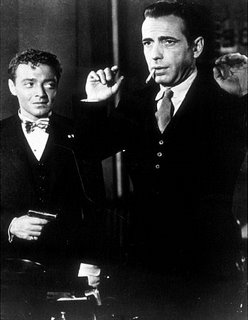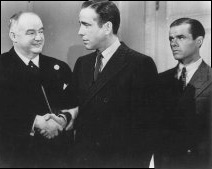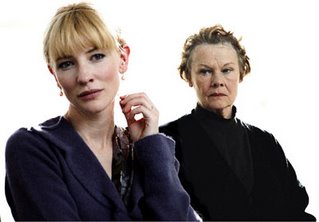 On yesterday’s Michael Parkinson’s Sunday Supplement I was reviewing the new film release Notes on a Scandal with its much-lauded and Oscar-nominated performances by Judi Dench and Cate Blanchett.
On yesterday’s Michael Parkinson’s Sunday Supplement I was reviewing the new film release Notes on a Scandal with its much-lauded and Oscar-nominated performances by Judi Dench and Cate Blanchett.Based on the best-selling, award-winning novel by Zoë Heller, the scandal in question is viewed through the eyes of Barbara Covett (Dench), an acid-tongued spinster who teaches history in a tough inner-city school.
Barbara is a loner with no friends, until the arrival of the new and seductively sexy art teacher, Sheba Hart (Blanchett) who, as Barbara puts it, causes “a few ripples on our stagnant pond”!
When Sheba embarks on a passionate affair with a fifteen-year-old pupil and is discovered by Barbara, the older women uses her knowledge of Sheba’s guilty secret to blackmail her into showing a level of affection for which she has her own, deep, illicit cravings…
What is interesting about the way in which the characters are portrayed is that Barbara’s lesbian desires for the younger woman are seen as menacingly predatory, while Sheba’s illegal affair with an under-age child emerge as being more tragically ill-advised as opposed to being simply wrong.
Although director Richard Eyre claims that he was attempting to make a non-judgemental film, cinematic conventions overtake that intent and the bitter lesbian (as in The Killing of Sister George) clearly emerges as the villain…
Whilst re-viewing The Maltese Falcon (see yesterday’s post) I was struck by the thinly masked portrayal of gays as villains. Of course, Peter Lorre's depiction of Joel Cairo is, of course, screamingly obvious...

The white gloves, the gold-handled umbrella, the gardenia-scented handkerchief and and an over-dandified manner - in fact Hammett, who unlike Warner Brothers, didn’t have to worry about the censors, simply called him “queer”.
 But there is also the implication of a gay relationship between Sydney Greenstreet’s Kasper Gutman and his young body guard, Wilmer (Elisha Cook, Jnr), whom he refers to as being like his own son. Humphrey Bogart's Sam Spade, on the other hand, doesn't mince his words, calling Wilmer a "gunsel" - a bit of obscure yiddish street-slang for a young guy in a sexual relationship with an older man that was, in fact, so obscure, that it managed to slip past the usually vigilant censors.
But there is also the implication of a gay relationship between Sydney Greenstreet’s Kasper Gutman and his young body guard, Wilmer (Elisha Cook, Jnr), whom he refers to as being like his own son. Humphrey Bogart's Sam Spade, on the other hand, doesn't mince his words, calling Wilmer a "gunsel" - a bit of obscure yiddish street-slang for a young guy in a sexual relationship with an older man that was, in fact, so obscure, that it managed to slip past the usually vigilant censors.In The Maltese Falcon, great film though it is, the premise is as obvious as it was permissable to be: Gay = Bent (by which I mean both crooked and not-straight) just as it does in such other films as Hitchcock’s films Rope and Strangers on a Train.
What is interesting - and sobering - is that 45 years on, being gay can still provide a useful cinematic shorthand for creating a character who is essentially a villain and, therefore, undeserving of understanding or sympathy…

3 comments:
I don't know about that, Brian. I think Dame Judi could play Saddam himself and I would still find her appealing... She is absolutely the most fabulous most versatile actress of our times. I shall definitely try to go and see Notes on a Scandal as soon as it comes out in my neck of the woods.
Hi Brian,
Thanks for stopping by, and indeed yes I am very much enjoying your book. Thanks for writing it and going through what I'm sure was a very interesting yet exhaustive process. There must have been times were you wondered if you'd ever get it done?!
I'm a great admirer of Peter Jackson's work and career, so for me it's very inspiring to read about how it all happened. If your speaking to Peter tell him I said thanks for being up for it! He's given me a boost.
By the way, I read your comments about the Maltese Falcon and the homosexual innuendo. I was always so impressed with how the films of the 30's, 40's & 50's hid gay themes, you scrape the surface on some of these works and film become a kind of pent up treasure trove of pure repression. But what was brilliant about the writing of the time was how they desguised it in such a way that it's only just out of few, until it's pointed out and then you can never see it any other way.
I remember I first discovered the gay theme running through Ben-Hur, the film suddenly burst into new life for me.
Have you ever seen the documentary 'The Celluloid Closet'? I'm sure you have. But it's a very interesting documentary about a fascinating subject.
Signing off. Thanks again for the book. Just getting into the Lord of the Rings stuff! Can't wait!
Frank
Welcome to MY blog, FWK!
I have to say the chances of my chatting to PJ are -- how shall I put it? -- SLIM, but you never know... ;-)
Whatever Peter's shortcomings maybe (and different people will draw up different lists) there is no doubting that his career has - in addition to leaving a milestone on the time-line of movie history - inspired many others, such as yourself...
Good luck with all your own filmic endeavours - and, if it doesn't take you TOO long to reach full-on, all-out, Oscar-winning success, then I may still be around to write about them!! ;-)
Concerning your comments on Hollywood gaydom: the many oblique references were, surely, imposed rather than made by choice. Had the studios been unfettered, one wonders how some of those pink-tinged characterizations would have been portrayed...
Thank you for reminding me about the excellent documentary, The Celluloid Closet which is, as you say,amazingly revealing about many films including BEN HUR and, one of my own, all-time favourites, SPARTACUS...
Post a Comment